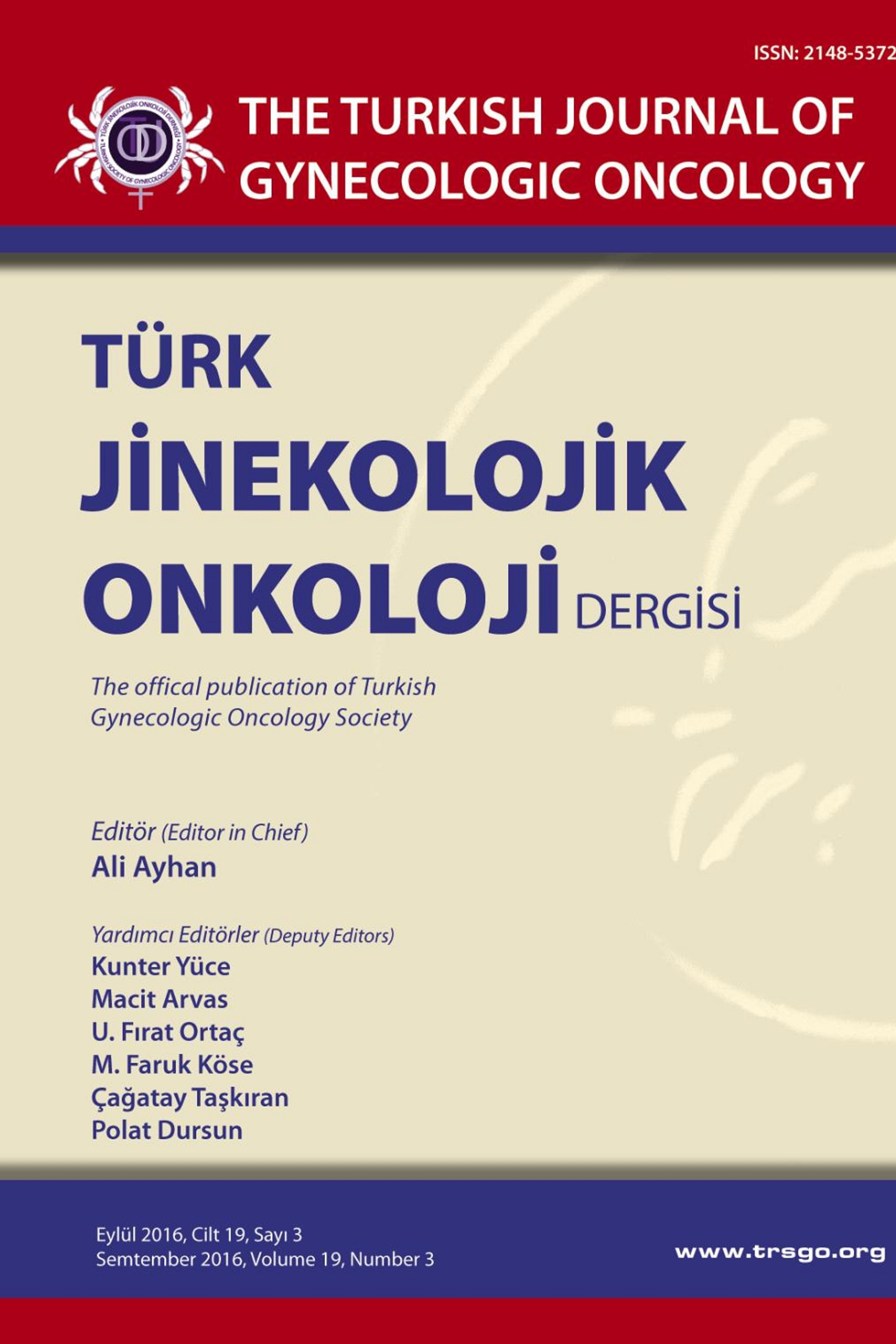SERVİKS SKUAMÖZ HÜCRELİ KANSERİN ÖVERE METASTAZI VE TRAKELEKTOMİ İŞLEMİNİN LİTERATÜR EŞLİĞİNDE DEĞERLENDİRİLMESİ
Serviks kanseri, konservatif yaklaşım, fertilite koruyucu cerrahi.
OVARIAN METASTASIS OF CERVIX SQUAMOUS CELL CARCINOMA AND EVALUATION OF THE LITERATURE ABOUT TRACHELECTOMY PROCESS
___
- 1. Gien LT, Covens A. Fertility-sparing options for early stage cervical cancer. Gynecol Oncol 2010;117:350-357.
- 2. Covens A, Rosen B, Murphy J et al. Changes in the demographics and perioperative care of stage Ia(2)/Ib(l) cervical cancer over the past 16 years. Gynecol Oncol 2001;81:133-137.
- 3. Dursun P1, LeBlanc E, Nogueira MC. Radical vaginal trachelectomy (Dargent’s operation): a critical review of the literature. Eur J Surg Oncol. 2007;33(8):933-41.
- 4. Sato S1, Aoki D, Kobayashi H, Saito T, Nishimura R, Nagano T, Yaegashi N, Enomoto T, Kigawa J. Questionnaire survey of the current status of radical trachelectomy in Japan. Int J Clin Oncol. 2011;16(2):141-4.
- 5. Smith JR, Boyle DCM, Corless DJ, et al. Abdominal radical trachelectomy: a new surgieal teelmique for the conservative management ofcervieal carcinoma. Br J Obstet Gynaeeol. 1997;104(10):1196-200.
- 6. Rodriguez M, Guimares O, Rose PG. Radical abdominal trachelectomy and pelvic lymphadenectomy with uterine conservation and subsequent pregnancy in the treatment of early invasive cervical cancer. Am J Ob stet Gynecol 2001; 185:370.
- 7. Palfalvi L, Ungar L, Boyle DC, Del Priore G, Smith JR. Announcement of healthy baby boy bom following abdominal radical traehelectomy. Int J Gynecol Caneer 2003; 13:250.
- 8. Nishio H, Fujii T, Kameyama K et al. Abdominal radical trachelectomy as a fertility-sparing procedure in women with early-stage cervical cancer in a series of 61 women. Gynecol Oncol 2009;115:51-55.
- 9. Karateke A1, Kabaca C. Radical abdominal trachelectomy is a safe and fertility preserving option for women with early stage cervical cancer. Eur J Gynaecol Oncol. 2012;33(2):200-3.
- 10. David N. Are they really asymptomatic? Int J STD AIDS 2008;19:575.
- 11. Burnett AF, Roman LD, O’Meara AT, Morrow CP. Radical vaginal trachelectomy and pelvic lymphadenectomy for preservation of fertility in early cervical carcinoma. Gynecol Oncol 2003;88:419-23.
- 12. Marchiole P, Benchaib M, Buenerd A, Lazlo E, Dargent D, Mathevet P. Oncological safety of laparoscopic-assisted vaginal radical trachelectomy (LARVT or Dargent’s operation): a comparative study with laparoscopic-assisted vaginal radical hysterectomy (LARVH). Gynecol Oncol 2007;106:132- 41.
- 13. Kim JH1, Park JY, Kim DY, Kim YM, Kim YT, Nam JH. Fertility-sparing laparoscopic radical trachelectomy for young women with early stage cervical cancer. BJOG. 2010;117(3)340-7.
- 14. Diaz JP, Sonoda Y, Leitao MM, Zivanovic O, Brown CL, Chi DS, et al. Oncologic outcome of fertility-sparing radical trachelectomy versus radical hysterectomy for stage IB1 cervical carcinoma. Gynecol Oncol. 2008;111:255-60.
- 15. Beiner ME, Hauspy J, Rosen B, Murphy J, Laframboise S, Nofech-Mozes S, et al. Radical vaginal trachelectomy vs. radical hysterectomy for small early stage cervical cancer: a matched case-control study. Gynecol Oncol. 2008;110:168-71.
- 16. Shepherd JH1, Spencer C, Herod J, Ind TE. Radical vaginal trachelectomy as afertility-sparing procedure in women with early-stage cervicalcancer-cumulative pregnancy rate in a series of 123 women. BJOG. 2006;113(6):719-24.
- 17. Wong I1, Justin W, Gangooly S, Sabatini L, Al-Shawaf T, Davis C, et al. Assisted conception following radical trachelectomy. Hum Reprod. 2009;24(4):876-9.
- 18. Jackson KS, Das N, Naik R, Lopes AD, Godfrey KA, Hatem MH, et al. Laparoscopically assisted radical vaginal hysterectomy versus radical abdominal hysterectomy for cervical cancer: a match controlled study. Gynecol Oncol 2004;95:655-61.
- 19. Xu L1, Sun FQ, Wang ZH. Radical trachelectomy versus radical hysterectomy for the treatment of early cervical cancer: asystematic review. Acta Ob stet Gynecol Scand. 2011;90(11)1200-9.
- 20. Carter J, Smirnova S. A personal experience with radical abdominal trachelectomy for the conservative management ofi nvasive cervical cancer. Aust NZ J Ob stet Gynaecol. 2011;51(2):177-82.
- 21. Gottschalk E, Mangler M, Schneider A, Koehler C, Lanowska M. Pregnancy after lymphadenectomy and neoadjuvant chemotherapy followed by radical vaginal trachelectomy inFIGO stage IB1 cervical cancer. Fertil Steril. 2011;95:2431. e5 -7.
- 22. Jaiman S, Surampudi K, Gundabattula SR1, Garg D. Bilateral ovarian metastatic squamous cell carcinoma arising from the uterine cervix and eluding the Mullerian mucosa. Diagn Pathol. 2014;9:109. 322
- ISSN: 2148-5372
- Başlangıç: 2014
- Yayıncı: Türk Jinekolojik Onkoloji Derneği
TUBANIN MALİGN MİKST MÜLLERİAN TÜMÖRÜ: MORFOLOJİK AÇIDAN FARKLI İKİ OLGU
Cem ÇOMUNOĞLU, Özlem ÖNEN, Kübra BOYNUKALIN, Cem BAYKAL, Ali AYHAN
RETROPERİTONEAL VASKÜLER VARYASYONLAR VE JİNEKOLOJİK ONKOLOJİ CERRAHİSİNDEKİ ÖNEMİ
Murat ÖZ, Salim ERKAYA, Bülent ÖZDAL, Mehmet Mutjlu MEYDANLI, İlker SELÇUK, Tayfun GÜNGÖR
RADİKAL JİNEKOLOJİK CERRAHİNİN ÜRİNER İNKONTİNANS’ A ETKİSİ
Tolgay Tuyan İLHAN, Ayşe Gül KEBAPÇILAR, Berat Berrin GENÇOĞLU, Türkan İLHAN, Tansel ÇAKIR, Çetin ÇELİK
BORDERLİNE OVER TÜMÖRLERİ: TANI,TEDAVİ, TAKİP
Orhan ÜNAL, Önder SAKİN, Bülent KARS
Cem DANE, Hilal AŞIK, Selçuk ATALAY, Cansu BENLİ IŞIK
İNVAZİV DUKTAL MEME KANSERİNDE GEÇ GENİTAL NÜKS: OLGU SUNUMU
Mehmet Hakan YETİMALAR, Aylin ORGEN ÇALLI
BİR ÜNİVERSİTE HASTANESİNDE GESTASYONEL TROFOBLASTİK HASTALIK OLGULARININ DEĞERLENDİRİLMESİ
